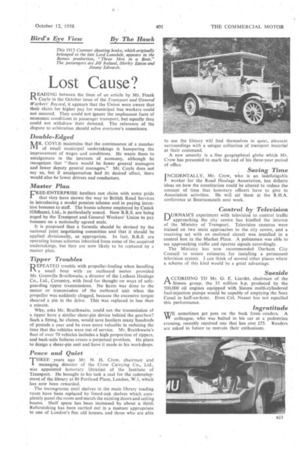Lost Cause?
Page 57

If you've noticed an error in this article please click here to report it so we can fix it.
READ1NG between the lines of an article by Mr. Frank IX Coyle in the October issue of the Transport and General orkers' Record, it appears that the Union were aware that their claim for higher pay for municipal bus workers could not succeed. They could not ignore the unpleasant facts of economic conditions in passenger transport, but equally they could not withdraw their demand. The reference of the dispute to arbitration should salve everyone's conscience.
Double-Edged
MR. COYLE maintains that the continuance of a number of small municipal undertakings is hampering the improvement of wages and conditions. He wants them to amalgamate in the interests of economy, although he recognizes that "there would be fewer general managers and fewer deputy general managers." Mr. Coyle does not say so, but if amalgamation had its desired effect, there would also be fewer drivers and conductors.
Master Plan
FREE-ENTERPR1SE hauliers can claim with some pride that they have shown the way to British Road Services in introducing a model pension scheme and in paying incentive bonuses to staff. The bonus scheme employed by Cusick (Oldham), Ltd., is particularly sound. Now B.R.S. are being urged by the Transport and. General Workers' Union to pay bonuses on a nationally agreed scale.
11 is proposed that a formula should be devised by the national joint negotiating committee and that it should be applied divisionally, as appropriate. In fact, B.R.S. are operating bonus schemes inherited from some of the acquired undertakings, but they are now likely to be replaced by a master plan.
Tipper Troubles
REPEATED trouble with propeller-fouling when handling a small boat with an outboard motor provided Mr. Grenville Braithwaite, a director of the Latham Haulage Co., Ltd., Coventry, with food for thought on ways of safeguarding tipper transmissions. No harm was done to the motor or transmission of the outboard unit when the propeller was suddenly clogged, because the excessive torque sheared a pin in the drive. This was replaced in less than a minute.
Why, asks Mr. Braithwaite, could not the transmission of a tipper have a similar shear-pin device behind the gearbox? Such a fitting, he claims, would save hauliers many hundreds of pounds a year and be even more valuable in reducing the time that the vehicles were out of service. Mr. Braithwaite's fleet of over 70 vehicles includes a high proportion of tippers, and back-axle failures create a perpetual problem. He plans to design a shear-pin unit and have it made in his workshops.
Peace and Quiet
THREE years ago Mr. H. H. Crow, chairman and I managing director of the Crow Carrying Co., Ltd., was appointed honorary librarian of the Institute of Transport. He brought to his task a zeal for the redevelopment of the library at 80 Portland Place, London, W.1, which has now been rewarded.
The incongruous steel shelves in the main library reading room have been replaced• by limed-oak shelves which completely panel the room and match the existing doors and ceiling beams. Shelf space has been increased, by about a third. Refurnishing has been carried out in a manner appropriate to one of London's fine old houses, and those who are able to use the library will find themselves in quiet, pleasant surroundings with a unique collection of transport material at their command.
A new amenity is a fine geographical globe which Mr. Crow has presented to mark the end of his three-year period of office.
. Saving Time
INCIDENTALLY, Mr. Crow, who is an indefatigable I worker for the Road Haulage Association, has definite ideas on how the constitution could be altered to reduce the amount of time that honorary officers have to give to Association activities. He will air them at the R.H.A. conference at Bournemouth next week.
Control by Television
nURRAM'S experiment with television to control traffic approaching the city centre has kindled the interest of the Ministry of Transport. Television cameras were trained on two main approaches to the city centre, and a receiving set with an enclosed circuit was installed in a control box in the Market Place. A policeman was able to see approaching traffic and operate signals accordingly. The Ministry has now recommended Durham City Council to secure estimates for installing a permanent television system. I can think of several-other places where a scheme of this kind would be a great advantage.
Suezide
A CCORDING TO Mr. G. E. Liardet, chairman of the 1-5. Simms group, the 35 million h.p. produced by the 500,000 oil engines equipped with Simms multi-cylindered fuel-injection pumps would be capable of emptying the Suez Canal in half-an-hour. Even Col. Nasser has not equalled this performance.
Ingratitude
wE sometimes get pats on the back from readers. A colleague, who was halted in his car at a pedestrian crossing, recently received one that has cost 155. Readers are asked in future to restrain their enthusiasm.




















































































































